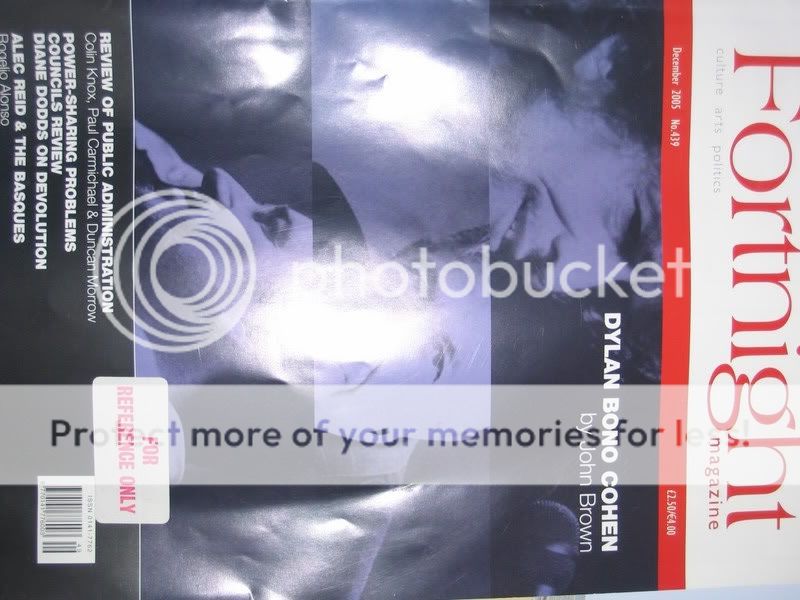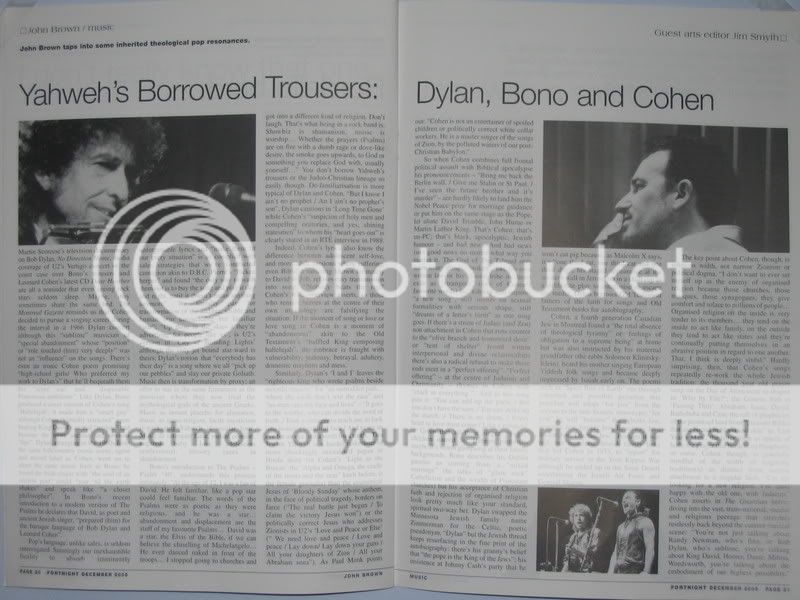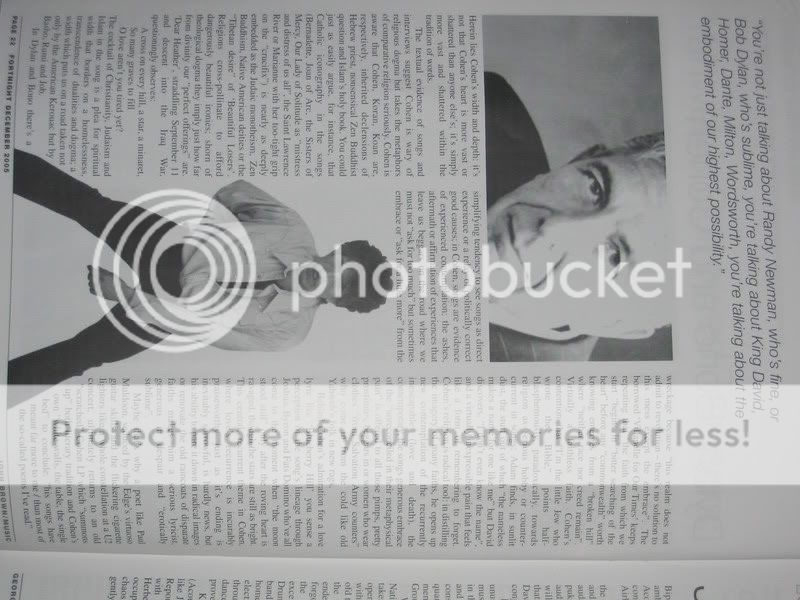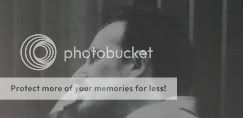I've sent a copy of the image your way sue4u2. Just in case anyone else wants to read what's on those two pages as well (I realise the text's very small) here's what it says:
Martin Scorsese’s television documentary on Bob Dylan, No Direction Home, media coverage of U2’s Vertigo concert or the court case over Bono’s trousers and Leonard Cohen’s latest CD Dear Heather are all a reminder that even ageing rock stars seldom sleep. Maybe, they sometimes share the same bed. The Montreal Gazette reminds us that Cohen decided to pursue a singing career during the interval in a 1996 Dylan concert although this “sublime” musician of “special abandonment” whose “position” or “role toughed (him) very deeply” was not an influence on the songs. There’s even an ironic Cohen poem promising “high-school girls/ Who preferred my work to Dylan’s” that he’ll bequeath them his “stone ear/ and… disposable Franciscan ambitions. Like Dylan, Bono produced a cover of Cohen’s song ‘Hallelujah’: it made him a “smart guy” although Cohen “virtually retracted” upon hearing King David’s sacred “tongue” had become the more secular and obvious “lips”. Dylan, emerging in the 1960s from the same folk/country music scene, agent and record label as Cohen, went on to share the same music fixer as Bono; he found the Irish singer with “the soul of an ancient poet” could “roar ‘til the earth shakes” and could speak like “a closet philosopher”. In Bono’s recent introduction to a modern version of the Psalms he declares that David, as poet and ancient Jewish singer, “prepared (him) for the baroque language of Bob Dylan and Leonard Cohen”.
Pop’s language, unlike sales, is seldom interrogated. Seemingly our inexhaustible facility to absorb imminently unforgettable lyrics and “make them fit our every situation” is so complicit with sales strategies that we’ve contracted contagion akin to D.B.C. Pierre’s “fucken herpes” and found “the only way to wash them out is to buy the song and play it day and night, until it doesn’t mean anything anymore.” We literally pay for the transformation of the audible, visual and human into untouchable but familiar “star”: “Up there in the skies/ they’re advertising for people like us”, is U2’s version in ‘City of Blinding Lights’ although the only jet bound star-ward is theirs; Dylan’s notion that “everybody has their day” is a song where we all “pick up our pebbles” and slay our own private Goliath. Music then is transformation by proxy; an offer to star in the same firmament as the musician where they now rival the mythological gods of the ancient Greeks. Music as an instant placebo for alienation, music as quasi-religion, facile mysticism re-packaging Yaweh in secular form. Music as surrogate fame, instant comfort, sugared baby love, adolescent confessional, illusory cures in abandonment.
Bono’s introduction to the Psalms – Psalm ‘40’, understands this process intimately: “At the age of 12, I was a fan of David. He felt familiar, like a pop star could feel familiar. The words of the Psalms were as poetic as they were religious, and he was a star… abandonment and displacement are the stuff of my favourite Psalms… David was a star, the Elvis of the Bible, if we can believe the chiselling of Michelangelo… He even danced naked in front of the troops… I stopped going to churches and got into a different kind of religion. Don’t laugh. That’s what being in a rock band is. Showbiz is shamanism, music is worship… whether the prayers (Psalms) are on fire with a dumb rage or dove-like desire, the smoke goes upwards, to God, or something you replace God with, usually yourself…” You don’t borrow Yaweh’s trousers or the Judeo-Christian lineage so easily though. De-familiarisation is more typical of Dylan and Cohen. “But I know I ain’t no prophet/ An I ain’t no prophet’s son”, Dylan cautions in ‘Long Time Gone’ while Cohen’s “suspicion of holy men and compelling oratories, and yes, shining statesmen” to whom his “heart goes out” is clearly stated in an RTÉ interview in 1988.
Indeed, Cohen’s lyrics also know the difference between adolescent self-love, and more adult versions where suffering, even Biblical suffering known intimately to David or Job, refuses easy transmission. “Nobody beats the rap,” Cohen’s RTÉ interview asserts, so those who remain heroes at the centre of their own mythology are falsifying the situation. If the moment of song or love or love song in Cohen is a moment of “abandonment” akin to the Old Testament’s “baffled King composing hallelujah”, the embrace is fraught with vulnerability, jealousy, betrayal, adultery, domestic mayhem and mess.
Similarly, Dylan’s ‘I and I’ leaves the “righteous king who wrote psalms beside moonlit streams” for “an untrodden path… where the swift don’t win the race” and “no man sees my face and lives” – “It goes to the worthy, who can divide the word of truth. / Took a stranger to teach me, to look into justice’s beautiful face/ And to see an eye for an eye and a tooth for a tooth.” This Jewish Yaweh is a harder taskmaster or more shockingly sexualised pagan or Hindu deity (in Cohen’s ‘Light as the Breeze’ the “Alpha and Omega, the cradle of the rivers and the seas” knelt before, is the female genitalia) than the ecumenical Jesus of ‘Bloody Sunday’ whose anthem, in the face of political tragedy, borders on farce (“The real battle just begun / To claim the victory Jesus won”) or the politically correct Jesus who addresses Zionists in U2’s ‘Love and Peace or Else’ (“ We need love and peace / Love and peace / Lay down / Lay down your guns / All your daughters of Zion / All your Abraham’s sons”). As Paul Monk points out: “Cohen is not an entertainer of spoiled children or politically correct white collar workers. He is a master singer of the songs of Zion, by the polluted waters of our post-Christian Babylon.”
So when Cohen combines full frontal political assault with Biblical apocalypse his pronouncements – “Bring me back the Berlin wall, / Give me Stalin or St Paul, / I’ve seen the future brother and it’s murder” – are hardly likely to land him the Nobel Peace prize for marriage and guidance or put him on the same stage as the Pope, let alone David Trimble, John Hume or Martin Luther King. That’s Cohen; that’s un-PC; that’s black, apocalyptic, Jewish humour – and bad news. And bad news isn’t good news no matter what way you market it. The God of The Talmud may leave many things “broken”, like his own written law or his chosen tribe in desert exile as “strangers” (one of Cohen’s favourite words) but Yaweh still requires “a new song”, still insists on textual formalities with serious shape, still “dreams of a letter’s birth” as one song goes. If there’s a strain of Judaic (and Zen) non-attachment in Cohen that runs counter to the “olive branch and homeward dove” or “tent of shelter” found within interpersonal and divine relationships there’s also a radical refusal to make these ends meet in a “perfect offering” – at the centre of Judaism and Christianity – rhymes in Cohen with “crack in everything”. And as this song puts it: “You can add up the parts, / But you don’t have the sum, / You can strike up the march, / There is no drum, / Every heart to love must come / Like a refugee.”
Given that all three singers “begat” children named for Hebrew patriarchs maybe it’s worth glimpsing at their family backgrounds. Bono describes his Dublin parents as coming from a “mixed marriage” (he talks of “glam rock” Catholicism and the wealth of Protestant churches) but his acceptance of Christian faith and rejection of organised religion look pretty much like your standard, spiritual two-way bet. Dylan swapped the Minnesota Jewish family name Zimmerman for the Celtic, poetic pseudonym, “Dylan” but the Jewish thread keeps resurfacing in the fine print of his autobiography: there’s his granny’s belief that “the pope is King of the Jews”; his insistence at Johnny Cash’s party that he won’t eat pig because, as Malcolm X says, it’s “one third rat, one third cat and one third dog”; his staged appearance at the western wall in Jerusalem in a skull cap as a deliberate ploy to antagonise or escape the media. Dylan borrows Old Testament fathers of the faith for songs and Old Testament books for an autobiography.
Cohen, a fourth generation of Canadian Jew in Montreal found a “the total absence of theological tyranny” or ‘feelings of obligation to a supreme being” at home but was also instructed by his maternal grandfather (the rabbi Solomon Klinitsky-Klein), heard his mother singing European Yiddish folk songs and became deeply impressed by Isaiah early on. The poems such as ‘Spice Box of Earth’ run through inherited and possible personas this poet/Jew will adopt “for you” from the serious to the anti-Semitic stereotype; “for you” he will “become” the “ghetto Jew, apostate Jew, banker Jew, Broadway Jew, doctor Jew, Dachau Jew”. Perhaps it was real, not imagined, Jewish family links that led Cohen in 1973, to “report” for military service in the Yom Kippur War although he ended up in the Sinai desert entertaining the Israeli Air Force and General Sharon.
The key point about Cohen, though, is religious width, not narrow Zionism or political dogma. “I don’t want to ever set myself up as the enemy of organised religion because those churches, those mosques, those synagogues, they give comfort and solace to millions of people… Organised religion on the inside is very tender to its members… they tend on the inside to act like family, on the outside they tend to act like states and they’re continually putting themselves in an abrasive position in regard to one another. That, I think is deeply sinful.” Hardly surprising, then, that Cohen’s songs repeatedly re-work the whole Jewish tradition of the thousand year old prayer sung on the Day of Atonement re-shaped in ‘Who by Fire?’; the Genesis Fall in ‘Passing Thru’. Abraham, Isaac, David, Bathseba and Cain; the raft of prophecies of the promised land from “pleasant Bibles that are bound in blood and skin” in ‘Last Year’s Man’, the letter form as epistle of faith; the prayer that borders on blasphemy or curse. Cohen, though, is generally mindful of the width of linguistic tradition(s) as distinct from narrow attachment to a singular faith. “I’m not quite looking for a new religion. I’m quite happy with the old one, Judaism,” Cohen asserts in The Guardian before driving into the vast, trans-national, secular and religious peerage that stretches relentlessly back beyond the current musical scene: “You’re not just talking about Randy Newman, who’s fine, or Bob Dylan, who’s sublime, you’re talking about King David, Homer, Dante, Milton, Wordsworth, you’re talking about the embodiment of our highest possibility.”
All the errors, as far as I know, are those made by the author himself. I've copied up the article as faithfully as possible, so if there are any mistakes, as far as I'm aware, they're his, not mine.

And if you ask me, this guy's a bit of a Cohen fan. Just look at how diligently he can reel off dates and quotes about the man whilst taking the very Belfastern (and indeed Northern Irish) stance of 'If it's got anything to do with Bono, I hate it'.

 !). This was only to find out that I have no idea how to work the scanner, so photgraphs will have to suffice! It's from December 2005 and is an article on the religions of Bob Dylan, Bono, and Leonard Cohen.
!). This was only to find out that I have no idea how to work the scanner, so photgraphs will have to suffice! It's from December 2005 and is an article on the religions of Bob Dylan, Bono, and Leonard Cohen.




 Anywho, hope you like it!
Anywho, hope you like it! !). This was only to find out that I have no idea how to work the scanner, so photgraphs will have to suffice! It's from December 2005 and is an article on the religions of Bob Dylan, Bono, and Leonard Cohen.
!). This was only to find out that I have no idea how to work the scanner, so photgraphs will have to suffice! It's from December 2005 and is an article on the religions of Bob Dylan, Bono, and Leonard Cohen.








 an expression of low opinion
an expression of low opinion
